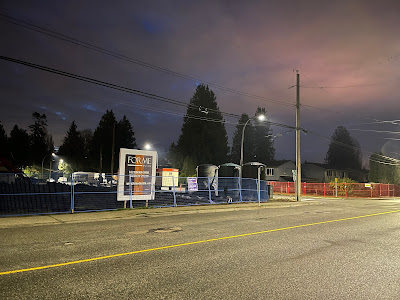
|
| One of many projects under control in the Brydon area of Langley City. |
David Eby, the minister responsible for housing in BC, has stated in the media that “the [role of] city government is to talk about the where — and maybe what [housing] looks like — but not whether or not the house goes ahead.” He stated that he would be introducing new legislation in the fall sessions of the BC Legislature that would address the supply side of the housing and hinted that it might result in local governments losing some power.
The most powerful tool local governments have is zoning, specifically the rezoning process. Generally, when someone wants to increase the density of a property, they must go through a rezoning process. The ability of a local government to deny a rezoning request allows local governments to negotiate benefits for the community, including providing affordable housing.
For example, Council granted rezoning to enable redevelopment of the Langley Lions Housing Society’s building under the condition that the society sign a housing agreement to ensure that the new housing remains affordable and seniors oriented.
Council is also discussing a Tenant Relocation Plan policy tonight. If approved, Council would apply this policy during the rezoning process to ensure that owners of purpose-built rental buildings provide early notice, compensation beyond provincial requirements, and help find new rental units for tenants if a building is being redeveloped.
Council can also use rezoning to ensure that a percentage of a new project is affordable housing units.
Council uses its power to deny rezoning to negotiate funds from developers, which the City uses for infrastructure requiring upgrades due to increased density.
Some municipalities take a long time to get projects through the redevelopment pipeline, such as in the City of Vancouver. Some municipalities do not want any increase in density, such as in White Rock. There are also a few high-profile cases where a municipal council denied housing for people experiencing homelessness. These cases are the exception.
I know that in Langley City, projects can work their way through the development approval process, including Council approval, in under six months. The bottleneck usually is not Langley City.
One developer in Langley City, Whitetail Homes, has three projects under construction. They have two sites where Council has already approved redevelopment and a project working its way through the process.
I can think of several other properties where Council has provided approval in principle, but the developer has not moved forward due to matters within the developer’s control and not the City’s control.
I talked to someone I know who works in a developer office. They told me that getting skilled managers and tradespeople was their most significant reason why they couldn’t build more housing faster.
If developers could build anything they liked without Council approval, I believe the biggest bottleneck to building fast would still be the limited pool of skilled people and cost of materials.
One of the recently introduced provincial requirements is for municipalities to create housing needs reports which show “existing and projected gaps in housing supply requirement.” I think the province should require that municapilites inditify how they will fill the supply gap and require that to be incorporated into municipal Official Community Plans.

No comments:
Post a Comment
All comments are moderated.